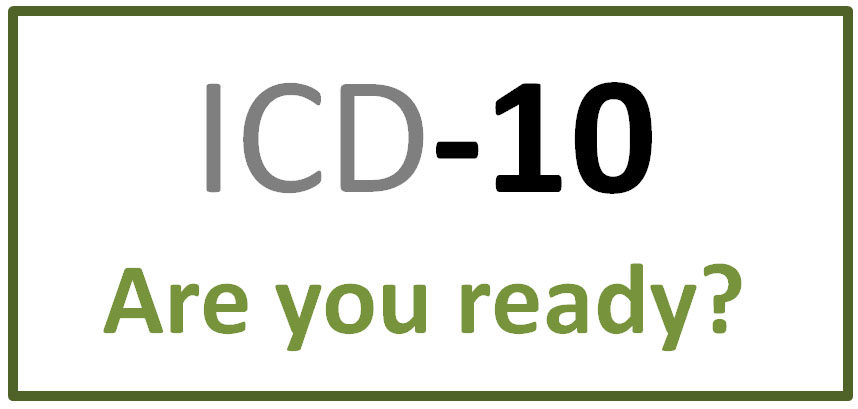The deadline to transition ICD-10 for all covered entities is October 1, 2014. If that seems like a long way off, it isn’t. In terms of actual work days[1], this timeframe is compressed to six months for medical and other healthcare practices to train staff, communicate with vendors, test software systems and claim files, and evaluate current processes to determine in what areas ICD-10 will affect day-to-day office functions.
IMPACT ON REIMBURSEMENT
If this sounds like a problem reserved for coders and billing staff, it isn’t. CMS’ ICD-10 Implementation Guide for Physician Practices advises, “Consider getting a line of credit to cover cash flow disruptions due to changing reimbursement models, delays in claims processing and re-processing, staff learning curve and long-term effects of the ICD-10 transition”[2]
Although CPT and HCPC based reimbursements will not change with the ICD-10 transition, indirectly, fee-for-service payments may have a potential to be adversely affected for the following reasons:
- Denials will increase because of incomplete or inaccurate translation of payment rules in payer systems as they attempt to translate these rules from ICD-9 to ICD-10
- Payments will be delayed because of challenges in claim processing in the ICD-10 environment.
Increased detail contained in ICD-10-CM means that the documentation required will change dramatically. The level of severity, comorbidities, complications, sequalae, manifestations, and causes that characterize the patient’s condition increases within the ICD-10 coding guidelines.
PLANNING IS EVERYTHING
ICD-10 Coordination Manager
Every office should have an ICD-10 Coordination Manager. Depending on the size of the practice, this could be one person or a committee of persons responsible for communication and coordination with staff, providers, and vendors on key dates and project timelines for an ICD-10 pre and post go-live.
The Coordination Manager will also:
- Coordinate training schedules and verify staff has attended and completed.
- Set an ICD-10 project budget in terms of training and software upgrade costs, coding books and guides, re-printing of encounter or referral forms with the new codes, if necessary, and other costs associated with ICD-10.
- Determine if re-training is necessary, as we get closer to the October 2014 timeframe.
He or she (or they) should ensure accurate coding decisions are being made, clinical documentation supports the new ICD-10 specificity requirements, and associated lags in productivity are identified and communicated.
Training
Speaking of training, although most ICD-10 literature advises staff and providers receive training no more than six to nine months from implementation, it is imperative to reserve slots now before classes fill up, or before less than desirable dates and times are the only ones left for either on-site training or off-site seminar. Don’t wait to contact professional associations around the April 2014 timeframe to find out the on-site ICD-10 trainer’s only availability is the same week Suzie in the business office goes out for surgery. Or, the only off-site workshop with any seats available is the week before Jane, your charge entry clerk, returns from maternity leave.
Resources
CMS, the American Academy of Professional Coders (AAPC), American InformationManagement Association (AHIMA) and Workgroup for Electronic Data Interchange(WEDI) all have information on ICD-10 training and factors to success.
WEDI and CMS have partnered in taking a proactive approach to answer questions and concerns regarding the ICD-10 transition. Organizations can submit questions, free of charge, to an online database.
[1] Based on regular Monday through Friday office hours
[2] ICD Implementation Guide for Small and Medium Practices, p. 31
—
Physician Practice Consultants is led by Jill Raykovicz, MHA, CMPE, CPC. Jill has over 15 years’ experience in physician practice management. She has a strong passion for leveraging this experience and expertise within the private-practice setting, in order to assist independent practices struggling to keep up with changes in healthcare reform, pay-for-performance quality measures, and shrinking reimbursement from third party payers.
Jill holds a Master of Health Administration from Cornell University, is a board-certified medical practice executive (CMPE) through the American College of Medical Practice Executives, and is a Certified Professional Coder (CPC) with the American Association of Professional Coders.
She is also a member of the National Society of Certified Healthcare Business Consultants and the North Carolina Healthcare Information and Communication Alliance ICD-10 Taskforce.
Jill may be reached at jill@physician-practice-consultants.com

